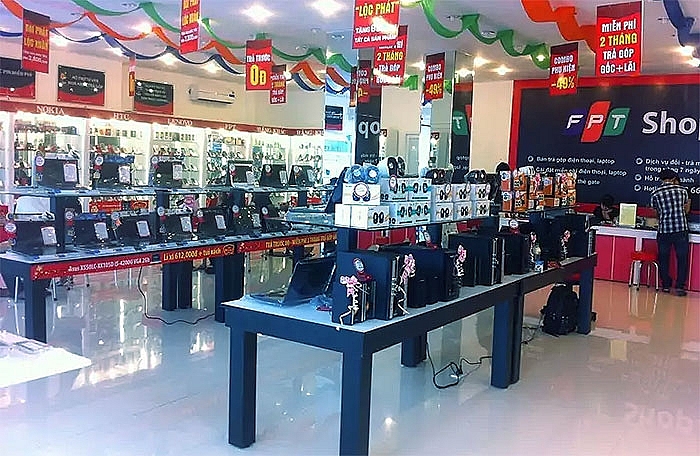Electronics chains prowl drug trade
 |
| Electronics chains prowl drug trade, FPT shop - source: internet |
The latest report by market research company Business Monitor International Research (BMI Research) stated that the total value of the local pharmaceutical market hit $5.3 billion, including the $1.6 billion pharmaceutical retail market, which is held by 57,000 drugstores across the country. Especially, no single chain occupies more than 5 per cent of the total market share, according to Chris Blank, founder and CEO of PharmaCity.
This means that the local pharmaceutical retail sector is in dire lack of leading brands. In fact, the number of drugstores under pharmaceutical retail chains makes up a minuscule portion of the 57,000. Specifically, PharmaCity runs 165 drugstores across the country, while Phano Pharmacy operates 60 and Vistar Pharmacy 20 stores.
This fragmented and multi-hued market offers great opportunities for technology retailers, which have long experience in running store chains.
After 15 years of operation, Mobile World Group (MWG) runs more than 1,000 thegioididong stores specialised in mobile devices, 700 Dien May Xanh stores specialised in consumer electronics, and 350 Bach Hoa Xanh stores selling food and necessities. Similarly, FPT Retail owns about 500 FPT Shop and F-Studio stores across the country.
Vingroup, a local interdisciplinary economic conglomerate, also officially entered the pharmaceutical distribution sector, utilising its knowhow from operating more than 1,000 Vinmart+ convenience stores and 74 Vinmart supermarkets across the country.
Vingroup’s establishment of Vinfa JSC as well as many deals between technology retailers and pharmaceutical firms in 2018 highlight retail giants’ migration into pharmaceutical retail.
Early November 2018, Vingroup launched 11 Vinfa drugstores in Hanoi, six months after establishing Vinfa JSC and the VND2.2 trillion ($95.65 million) pharmaceutical manufacturing and research centre in Bac Ninh.
“Investing in the pharmaceutical manufacturing centre is part of our strategy to expand Vingroup’s operations in the medical sector,” said Phan Thu Huong, chairwoman of Vinfa’s board of directors.
Similarly, after acquiring the Long Chau drugstores at the end of 2017, FPT Retail (under FPT Group) planned to increase the pharmaceutical chain to 400 units by 2022, opening an average of 100 drugstores each year. At present, there are 24 Long Chau drugstores located across the country.
At FPT’s annual general shareholders’ meeting that took place last March, Nguyen Bach Diep, chairman of FPT Retail, mentioned that the Long Chau drugstores enjoy higher average monthly sales than other stores in the market. Specifically, the stores generate $136,000 in sales revenue each month, while PharmaCity makes $11,000, Phano’s $18,000, and An Khang’s $32,000.
FPT Retail’s main rival, MWG, is also prowling the pharmaceutical distribution segment. Last year, MWG spent VND62 billion ($2.7 million) to own 49 per cent of An Khang Retail JSC. Currently, MWG runs eight An Khang drugstores in Ho Chi Minh City.
When first announcing their entrance into the pharaceutical sector in 2017, Nguyen Duc Tai, chairman of Mobile World Group, said that the company expected to spend VND500 billion ($21.74 million) in order to purchase 20-40 per cent of pharmaceutical retail chains, then raise its ownership ratio to 60 per cent.
According to Tai, as no firms occupy 20 per cent of the local pharmaceutical distribution market, there is no clear leader in the segment. Therefore, MWG planned to penetrate the market as soon as possible to beat competitors, and years of market research would cost the corporation valuable opportunities.
In addition to giants, smaller retailers Digiworld and Nguyen Kim have set their sights on moving into pharmacies.
At the beginning of last August, Nguyen Kim purchased 2.12 million Ladophar stocks (27.14 per cent), successfully raising its ownership from 24 to a controlling 51.14 per cent. Nguyen Kim made its first investment into Ladophar in late 2014 by buying 10 per cent of the firm’s capital. Afterwards, the technology retailer raised its ownership to 24 per cent. In addition to Ladophar, Nguyen Kim also invested in FT Pharma.
Recently Digiworld and Nestlé Vietnam also signed a strategic co-operation to develop nutritional and medical products. According to Digiworld’s 2018 business report, its revenue from healthcare and consumer products hit VND75 billion ($3.26 million), up 50 per cent on-year.
What the stars mean:
★ Poor ★ ★ Promising ★★★ Good ★★★★ Very good ★★★★★ Exceptional
 Tag:
Tag:
Themes: Healthcare
Related Contents
Latest News
More News
- PM outlines new tasks for healthcare sector (February 25, 2026 | 16:00)
- Ho Chi Minh City launches plan for innovation and digital transformation (February 25, 2026 | 09:00)
- Vietnam sets ambitious dairy growth targets (February 24, 2026 | 18:00)
- Masan Consumer names new deputy CEO to drive foods and beverages growth (February 23, 2026 | 20:52)
- Myriad risks ahead, but ones Vietnam can confront (February 20, 2026 | 15:02)
- Vietnam making the leap into AI and semiconductors (February 20, 2026 | 09:37)
- Funding must be activated for semiconductor success (February 20, 2026 | 09:20)
- Resilience as new benchmark for smarter infrastructure (February 19, 2026 | 20:35)
- A golden time to shine within ASEAN (February 19, 2026 | 20:22)
- Vietnam’s pivotal year for advancing sustainability (February 19, 2026 | 08:44)






















 Mobile Version
Mobile Version